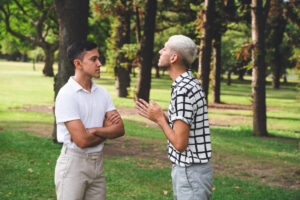
Gay Men and How to Ruin a Friendship: Ten Tips
In my 29 years as a gay men’s specialist therapist in Los Angeles, as well as being an AASECT Certified Sex Therapist, and life/career/executive coach for guys all over the world, I’ve helped a lot of guys with interpersonal relationships. This can be about dating, sexuality, workplace, and certainly domestic/romantic relationships. There are many “models” of therapy or coaching interventions that help a guy improve these relationships. But what about friendships? We could talk about what to do in order to “win friends and influence people,” as the classic book by Norman Vincent Peale talked about. But just for a certain dark-humored fun, let’s look at what not to do in a friendship, especially between two gay men. Based on my work with clients, and stories from friends, I’ve identified these ten tips if you really want to mess it up. And who doesn’t love that, right?
In no particular order, here they are:
- Being cheap. Yep. Be a cheap-ass queen. Be the old hold-out. Be that bitch that won’t part with a buck without a crowbar pulling it out of your clenched first. Pinch that penny til it screams. We’ve all seen this: Gurlfriend has a birthday dinner and everybody’s gotta pitch in, sometimes split in equal amounts according to the number of guests (minus the Birthday Bottom) divided into the check total, sometimes according to what each person ordered (the lushes with the premium vodka cocktails really drive up the tab). But Old Hold Out doesn’t want to put in his fair share, just to see what he can get away with. Or shows up at sit-down dinner party or even a wedding, empty-handed (which is both cheap and rude). Everything is always done on the cheap. And by this, I don’t mean a reasonable (key word: reasonable) attempt at sticking to a budget for long-term financial security (which I support); I’m talking about the queen who doesn’t have a money care in the world except for just being cheap for the sake of being cheap, not out of necessity. If you’re continually the one on the guest list that’s cheap to the point of others noticing, regularly, you will find you won’t make it to the guest lists for much longer (unless you are really, really pretty, and that has a certain shelf life that doesn’t last forever). You don’t want to “buy friends” by giving them money, expensive gifts, drugs, or pay their way every time you go out (movie tickets, dinner, admission tickets), but you do want to reasonably match the level of expenditure of your peers. This gets awkward when Gurlfriend wants to have her birthday party at an expensive restaurant and the bill is split evenly, which is when you have to make the painful decision to sit this one out and take them on a birthday lunch or dinner you can afford later. Good financial planning means you can provide for your long-term financial security and still not be the one who is clearly not paying their fair share. You don’t get to be financially secure by being cheap; you get to be financially secure by identifying and implementing a sound savings and investment plan over time.
Remedying this bad reputation is where your personal finance skills matches your interpersonal relations skills. Be aware about the portion of your personal financial management budget that’s allocated to meals out and other activities with your peers. Trust that if you allocate appropriate savings in other ways, such as always saving about ten to fifteen percent of your income, that you can spend another portion of your income for leisure. Trust that if everyone else is paying in proportion to what they are costing, you need to, also. There’s an inherent fairness and goodwill in equity (or relative equity: if you drank more, pitch in more). Having your friends experience you as reasonably fair, even generous, will earn you goodwill and make people want to hang out with you. But being cheap will alienate your friends so much you won’t have them as friends for long. Don’t be that guy. Trust in the process that you’re going to be OK.
- Complaining. I hear this one often, and I admit, I’ve been guilty of it. I try to really walk my talk for overall professional credibility, but even I have my vulnerabilities, especially earlier in my life. The complaining trap is when you use get-togethers with one or more friends to just vent and unload all the pet peeves, objections, stressors, and grave injustices you’ve experienced since you’ve last seen them. While it can feel good to vent (this is one of the many benefits of therapy) and get things off your chest, you want to bring a certain mindfulness to this. Because as the weight from your shoulders gets thrown off, sometimes it lands on your buddy – with an impact. The cumulative effect of this can be that your friend feels burdened by what you’re off-loading. That’s great for you, but it can make them feel used. This habit can also be sign of a bigger problem: you’re in the wrong job, you’re in the wrong relationship, you need to seriously improve your own self-care and burnout prevention, or you need more support and help for a possible clinical depression that’s making you hopeless or irritable.
To avoid this, be aware in the back of your mind while talking that you’re balancing “venting” with giving them a chance to speak, too, and see if you can “join forces” to do something about the mutual complaints, or to jointly identify fun things to balance out the peeves. Listen to them, sure, but also listen to yourself. Negative material in the verbal content of what you say can alienate people who are just wanting to have a nice time out with a friend. Play a game that every item you gripe about, another item is something that’s good news or that you’re grateful for.
-

Even gay men can be guilty of their own prejudices that offend others. Being racist. This should be a no-brainer by now, but it’s true; white gay men can be guilty of being bigoted and racist. Now, I don’t agree with the current “movement” going on that makes White Gay Men “part of the problem” politically and socially, and I see that happening too often these days. But I’ve seen/heard gay men being racist and I don’t like that any more than hearing people of color be homophobic. To advance the civil rights of all minorities, more minority groups need to band together to fight tyranny. Minority groups are stronger when we all fight together against the common enemy of bigotry and oppression. But I still hear remarks now and then, usually in the form of “jokes”, where (white) gay men are saying something offensive. Even if they’re not called out on it (and they should be), people can quietly cringe and your “stock price” of popularity will go down (in most cases; if they’re talking to a fellow racist, and “validating” them, then that’s another story, and that’s just a mess). Speak in ways that support dignity and social justice for others, including members of groups who aren’t even in the room. Even if you “read for filth” once in a while, do it in a way that’s funny, not offensive.
- Name-dropping. Since I live and work in Los Angeles (West Hollywood), the bad habit of name-dropping can be thing in gay social circles. It can be fun to share “brushes with celebrity greatness” (or foul-ness, as the case may be), but it’s a classic sign of social insecurity to name-drop about whom you’ve met, known, or worked with, as if you just being little ole you weren’t good enough. Now, this needs to be contrasted with people who are good raconteurs who tell a good story about famous people, but there’s a balance there. This is similar to speech that implies how much money you have, such as always talking about your access to luxury goods, services, or experiences, which also speaks to insecurity: “ I am valuable, because I can afford valuable things”. That’s a faulty logic, and it’s almost always alienating, especially if you’re speaking to someone who can’t afford those things. Modesty in social interactions leads to quality of social interactions, because you’re avoiding trying to imply you’re in some way superior to whomever you’re talking to. You want to make the people you’re talking to feel good about themselves and want to be with you, not feel bad about themselves in a way that makes them want to avoid you.
When guys complain about being lonely, this is the consideration they should reflect on, because if you’re often lonely, it could mean that you’re messing it up interpersonally when you’re with people.
- Being self-centered. Similar to name-dropping, if the content of what you’re saying socially has a lot “I this” and “I that” in it, it can send a subtle message that you don’t care about the person you’re talking, as long as you have a faceless, nameless, soul-less “audience” to play to. That makes the person you’re talking to feel invisible and invalidated. Asking open-ended questions of the other person, reflecting or validating what they’re saying, and asking “probing” questions about what they experienced, or how they feel, can engender goodwill and make the other person feel seen, heard, and understood, which is a great feeling to give them.
 Bad breath/hygiene/presentation. This one is fairly common, but it’s really taboo to talk about. Recently, I was at a fundraising event for my husband’s work and was meeting a very wealthy man who was major donor to the institution. He was late middle age, but as he spoke, I noticed he had particularly bad breath. Here was this interesting, accomplished, generous man, but this simple hygiene issue made me want to get away from him, and when I saw him at another event shortly thereafter, despite originally finding him very nice and very interesting, I still avoided him. Bad breath can indicate a tooth or gum problem, or possibly a digestive issue or even a large medical risk that needs the attention of a dentist, periodontist, internist, or other health care professional to address the cause and its treatment. Ask a trusted friend frankly if they think you have a breath problem, or any other trait about you that might be socially offensive. While some people (including gay men, especially leathermen) forego deodorant due to allergies or even appreciation of “manscent”, this also can be very controversial, depending on the “audience” and context. I don’t think there is much alternative other than to identify a trusted friend (or perhaps partner/spouse) just to “check on” what kind of social impression you make. If you sense at all that people (friends, colleagues, even strangers) avoid speaking with you, consider investigating if there is some variable/trait that could be alienating. There’s no shame in the exploration, and somehow addressing the issue can be enlightening and empowering, and lead to making a better impression on both friends and strangers.
Bad breath/hygiene/presentation. This one is fairly common, but it’s really taboo to talk about. Recently, I was at a fundraising event for my husband’s work and was meeting a very wealthy man who was major donor to the institution. He was late middle age, but as he spoke, I noticed he had particularly bad breath. Here was this interesting, accomplished, generous man, but this simple hygiene issue made me want to get away from him, and when I saw him at another event shortly thereafter, despite originally finding him very nice and very interesting, I still avoided him. Bad breath can indicate a tooth or gum problem, or possibly a digestive issue or even a large medical risk that needs the attention of a dentist, periodontist, internist, or other health care professional to address the cause and its treatment. Ask a trusted friend frankly if they think you have a breath problem, or any other trait about you that might be socially offensive. While some people (including gay men, especially leathermen) forego deodorant due to allergies or even appreciation of “manscent”, this also can be very controversial, depending on the “audience” and context. I don’t think there is much alternative other than to identify a trusted friend (or perhaps partner/spouse) just to “check on” what kind of social impression you make. If you sense at all that people (friends, colleagues, even strangers) avoid speaking with you, consider investigating if there is some variable/trait that could be alienating. There’s no shame in the exploration, and somehow addressing the issue can be enlightening and empowering, and lead to making a better impression on both friends and strangers.- Bragging. Similar to the above name-dropping, some guys have a maladaptive coping for social anxiety by way of bragging to others about owning expensive things, accessing expensive services, enumerating their accomplishments, or notifying/reminding others of their rewards or accomplishments. While taking an appropriate pride in what you do, whether for a living or for a hobby, is understandable, when you brag (or even “humble-brag”, like on social media), that can be an off-putting behavior to others, and, like the above-mentioned hygiene issues, but be something that no one ever even tells you is a problem; they just avoid you and you might never know why.
To address this, think about the overall “content” of your speech to others in most social situations: friends, family, acquaintances, neighbors, colleagues, etc., and ask yourself how much “bragging content” is in your speech. Are you reciting a lot of facts or points that are really just enumerating the “Reasons I’m Fabulous (More So Than You)”? If so, think about how you can restate those into perhaps things that you’re grateful for, or things you have fun with, and then turn it around and ask your conversation partner what they are grateful for, or what they have fun with. This will help your partner access positive feelings, that your conversation evoked, and make them (even unconsciously) drawn to you by associating you with positive feelings. If you brag, it can make them access negative feelings like envy, jealousy, frustration, loss, impatience, or even low self-esteem. Think about what feelings you evoke in others by what you say to them.
- Asking for favors. Trading favors with friends is what can be a part of what being a friend means. Giving rides, giving feedback, providing company, perhaps even pet sitting or lending appliances (like a Wet-Vac) can all be things a friend might do for another. But be careful about asking a friend who is a professional for their work-related advice, such as from an attorney, physician, or even therapist friend! There can be legal and ethical admonitions about giving professional counsel to personal contacts without their legal consent, and it’s also just poor boundaries that create a dual-relationship between being friends and colleagues. It’s also similar to the above being “being cheap,” that you’re being too miserly to hire a professional outright and you’re expecting your friend to suddenly go “on the clock” for free. This can be off-putting.
To address this, don’t ask for a favor without first thinking about the last time you did a favor for them. Is there at least some semblance of a sense of balance there? Is it give-and-take, or just the latest “take” you’re making from them? Too much of “accessing” their expertise, time, belongings, etc. can make your friend feel exploited – again, another negative emotion – in a way that might make them avoid you, even permanently. Another rule of thumb is don’t ask for a favor from someone (via email, text, or call) unless you also contact that person (especially recently) for a “non-favor” reason. Favors should be part of a broader friendship, not the basis for the whole relationship, such as only calling Joe when you need to use his stuff. Call Joe for going to the movies this weekend and lunch in two weeks. Then, in three weeks, if you need to use his Wet-Vac, ask, but only if you take him out to dinner a week later in return.
- Locker-room bragging. Gay men (especially, I think, the younger generation) has a tendency to kiss (or more!) and tell. Talking about (even bragging) about a sexual escapade or landing a date with a desirable person (“Guess who I totally sucked last night? Hunky Brandon from the gym!”) can again evoke feelings of envy or jealousy in your friend (my article on gym crushes is here). Now, perhaps your friend has positive emotions evoked – fun shock, amusement, vicarious joy for you, or pride in your chutzpah, but that can be debatable, especially if you enjoy “traditional appearance privilege” (my article on that is here) and they don’t. To address this, take your cue from your friend: Does he talk about his sexual experiences? Does the relating of “sexy stories” feel balanced to you, or is it just you (or him) who tells? How would the person being talked about (“Hunky Brandon from the gym”) feel if he knew he was being talked about? Would he feel embarrassed, exposed, objectified, or even betrayed? That could be considered a form of non-consent, and Consent is one of the primary Principles of Sexual Health (my article on how those are applied to gay men is here). As the saying goes, “discretion is the better part of valor.” Kiss and tell only with caution, even it is somewhat common for both straight male and gay male “cultures” to do this, but be careful of the “toxic masculinity” (gay or straight) implied in this (my article on that is here).
-

Are you really “there for” your gay male friends consistently? Being inconsistent/fair weather/unsupportive. Finally, a trait of good friends is that they are consistent and reliable. They are “there for you” during thick or thin. No one likes a “fair weather friend” who is there when you’re well and fun, but abandons you if you’re sick, depressed, busy, or burdened by something (like a personal emergency). Ever been in the hospital and notice which friends did, or did not, visit you? Ever had a serious illness that people knew about (COVID, cancer, flu, etc.) and notice who called or reached out, versus who didn’t? When I had cancer in 2001/2002, I really noticed who was “there for me” and who wasn’t. When it was all over, I made a conscious intention to spend more time with the friends who stuck by me, and less time (or none) with the so-called “friends” who didn’t. “A friend in need is a friend, indeed.” Part of what makes long-term, close friends feel good (and nostalgic) about their friends is the cumulative, enduring wealth of experiences shared over time, and like the wedding vows, “for better, for worse; in sickness, and in health.”
Are you supportive to your friends? If they announce they are writing a novel, do you undermine that by challenging them, or supporting their dream? If they want to embark on a special project, do you explore how that could help them, or do you “shoot down” their aspirations? The best friends are perceived as being encouraging and supportive, even if you need to occasionally give cautionary feedback (like if your friend is doing something dangerous, illegal, or somehow harmful to others).
Instead of just taking a negative action like “you don’t want to be that guy” who is guilty of the behaviors that tend to alienate friends, study also the most popular and well-regarded people you know. What traits do they have that you might be able to adapt for yourself? Everybody loves people like Dolly Parton or Betty White. What makes them so popular? Most people find Dolly funny, self-deprecating, self-expressive, hard-working, talented, and almost never an unkind word (maybe this is just “PR” to sell records, but I think it goes beyond that, to her credit). Betty White is known for longevity, her smile, humor, kindness to animals, work ethic, and down-to-earth wisdom (I’ve met her a few times, and while privately she can be known to have the slightly-unkind word for some who annoy her, putting in funny terms takes the sting out of it while still making her point, so you don’t have to be 100 percent angel all the time).
Or beyond famous people, who are you always glad to see at the gym, or that Pride celebration, or pool party, or holiday party, or charitable event? Now, ask yourself: Why are you glad to see them? What are they doing, behaviorally or verbally, that makes you associate them with attractive, positive qualities? Sure, if they are just “hot” and evoke lust in many/most, that will make them generally popular; those are the rules of appearance privilege. But how many of us have seen “hot” guys and found their personalities to be off-putting and make us avoid them? Now, think about hot, or funny, or clever, or generous guys, and how they make us feel. Even guys who smile a lot can increase their social cache, and that’s a pretty simple act to follow.
If you reduce the number of traits, above, that alienate friends, and increase the actions that attract them, you might feel more socially supported, less abandoned, more included, and more integrated into your local community of gay men. Try it over time, and see if you evoke a different scenario. It’s worth a try.
 If you want specialized help for how to cope with social anxiety, and to cultivate cognitive and behavioral traits that help you have better interpersonal relationships, consider therapy or coaching with a gay men’s specialist. Call/text 310-339-5778, or email Ken@GayTherapyLA.com for more information, to book an appointment.
If you want specialized help for how to cope with social anxiety, and to cultivate cognitive and behavioral traits that help you have better interpersonal relationships, consider therapy or coaching with a gay men’s specialist. Call/text 310-339-5778, or email Ken@GayTherapyLA.com for more information, to book an appointment.



 Bad breath/hygiene/presentation. This one is fairly common, but it’s really taboo to talk about. Recently, I was at a fundraising event for my husband’s work and was meeting a very wealthy man who was major donor to the institution. He was late middle age, but as he spoke, I noticed he had particularly bad breath. Here was this interesting, accomplished, generous man, but this simple hygiene issue made me want to get away from him, and when I saw him at another event shortly thereafter, despite originally finding him very nice and very interesting, I still avoided him. Bad breath can indicate a tooth or gum problem, or possibly a digestive issue or even a large medical risk that needs the attention of a dentist, periodontist, internist, or other health care professional to address the cause and its treatment. Ask a trusted friend frankly if they think you have a breath problem, or any other trait about you that might be socially offensive. While some people (including gay men, especially leathermen) forego deodorant due to allergies or even appreciation of “manscent”, this also can be very controversial, depending on the “audience” and context. I don’t think there is much alternative other than to identify a trusted friend (or perhaps partner/spouse) just to “check on” what kind of social impression you make. If you sense at all that people (friends, colleagues, even strangers) avoid speaking with you, consider investigating if there is some variable/trait that could be alienating. There’s no shame in the exploration, and somehow addressing the issue can be enlightening and empowering, and lead to making a better impression on both friends and strangers.
Bad breath/hygiene/presentation. This one is fairly common, but it’s really taboo to talk about. Recently, I was at a fundraising event for my husband’s work and was meeting a very wealthy man who was major donor to the institution. He was late middle age, but as he spoke, I noticed he had particularly bad breath. Here was this interesting, accomplished, generous man, but this simple hygiene issue made me want to get away from him, and when I saw him at another event shortly thereafter, despite originally finding him very nice and very interesting, I still avoided him. Bad breath can indicate a tooth or gum problem, or possibly a digestive issue or even a large medical risk that needs the attention of a dentist, periodontist, internist, or other health care professional to address the cause and its treatment. Ask a trusted friend frankly if they think you have a breath problem, or any other trait about you that might be socially offensive. While some people (including gay men, especially leathermen) forego deodorant due to allergies or even appreciation of “manscent”, this also can be very controversial, depending on the “audience” and context. I don’t think there is much alternative other than to identify a trusted friend (or perhaps partner/spouse) just to “check on” what kind of social impression you make. If you sense at all that people (friends, colleagues, even strangers) avoid speaking with you, consider investigating if there is some variable/trait that could be alienating. There’s no shame in the exploration, and somehow addressing the issue can be enlightening and empowering, and lead to making a better impression on both friends and strangers.
